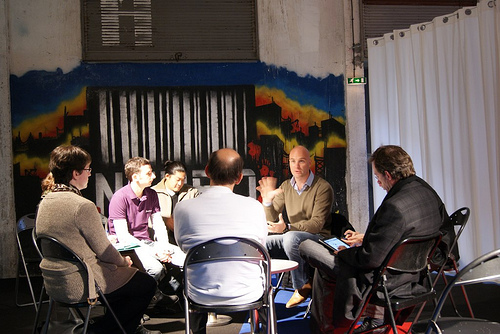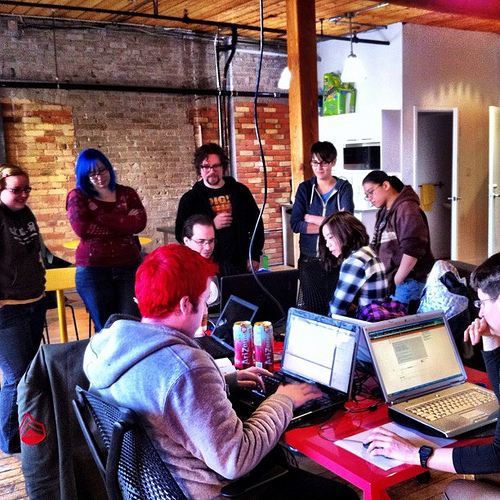Coworking spaces are environments in which mobile professionals can make connections and collaborate on creative projects. Studies confirm that shared workspaces increase worker productivity and happiness, and benefit the surrounding community as well.
But are completed to-do lists and well-supported freelancers the only ways coworking can impact the workforce, and thereby the larger economy? We think not.
In anticipation of the pre-SxSWi Global Coworking Unconference coming up next month, let's envision a coworking community that embraces other aspects of a sharing lifestyle in addition to collaborative work.
This year, we’ve seen Mutual Aid in Motion.
From scaling sharing hubs to Mutual Aid 101 trainings, we’re helping communities build the tools they need.
Every dollar fuels lasting resilience – proving that when we move together, we all move forward.
Although I hate the phrase, coworkers are the "low hanging fruit" when it comes to adopting collaborative behaviors. Coworkers already trust each other, and understand the benefits, both quantifiable and not, that comes from pooling resources, ideas, and space. It's safe to assume that they could make the leap from sharing desks to sharing other resources with less effort, giving coworking spaces yet another avenue through which to be an asset to the larger community.
While it may seem like extra work for owners or community managers, incorporating additional opportunities for sharing can yield attractive benefits for the space as a whole. By making it easy for coworkers to share resources, members will feel supported and more satisfied on multiple levels. This could lead to lower turnover, higher occupancy, and growth if there's room for it. The bottom line is that transforming collaborative work spaces into sharing hubs could help the coworking movement be more successful.
Below are just a few ways in which the global coworking community could expand its vision to become concentrated hubs for the sharing economy. Please feel free to add ideas or examples of how your coworking community is already branching out into additional modes of sharing, in the comments!
Bike/Ride/Car Sharing

Image via Werkheim-Hamburg
Coworking spaces know that in order to be useful, they have inhabit a convenient ocation. Whether it's the main street of a rural town, or the technological hub of a big city, a central home helps coworkers access the space as well as nearby amenities. A focus on practical location makes coworking spaces prime candidates for transportation-sharing ventures.
This could happen in any number of ways, depending on the size of the space and preferences of the members. Coworking spaces could offer parking spots for Zipcars or a meeting place for carpooling schemes like Zimride, while other spaces might prefer to host a bike sharing kiosk. The benefits would be two-fold: members would have easy access to transportation options, while residents seeking out these services would have a reason to interact with the coworking space.
Cohousing

Image via Indy Hall
Coworking is based on core values of community, openness, sustainability, accessibility and collaboration. Focusing on these values allows coworking spaces to nurture the professional wellness of their members, but what happens when they're applied to life in general?
Indy Hall, Philadelphia's most successful coworking space, recently decided to find out. In May 2011, Indy Hall announced its intention to build K'House, a cohousing community that will seek to use the experiences that have made Indy Hall’s coworking community so popular to support the evolving needs of an urban home.
The plan is to create six autonomous living spaces connected by large common areas. "Our take on cohousing creates a new opportunity to make the experiences people have at Indy Hall more available for people who don’t need a place to work," write the founders. The project has yet to break ground on it's South Kensington lot, but did recieve unanimous approval at a recent neighborhood advisory council zoning meeting.
Food/Gardening

Image via Flickr/seo_gun
At last year's Coworking UnConference, I had the opportunity to attend a session about how the coworking movement could use its momentum to catalyze the shift to a more independent food system, especially in urban areas. The session was led by Devin Balkind, a member of the Sarapis Foundation, which believes open source principles can be applied to more than just software.
According to Balkind, there are several reasons why coworkers are the ideal audience for food sharing projects: 1) coworkers need to eat and since they're concentrated in a space together it's very economical for them to arrange group buying relationships with local farms. 2) coworkers value their independence and understand that to achieve true self-reliance, one must have the capacity to create food or create relationships with people who do. And there's also a third opportunity for connection, though one that few (if any) coworking spaces are taking advantage of at this time: small farmers make ideal coworkers.
Swaps/Lending Libraries

Image via Little Free Library
My home coworking space, Cohere, offers a small collection of professional and inspirational books for members to browse or borrow, and I'll bet that many other spaces have something similar. But why limit this sharing to reading materials? With such high physical density, coworking spaces are the ideal environment for swapping endeavors. Members could organize regular swaps for everything from clothes to media, or there could simply be a "free box" into which gently used items could be recycled back into the community. Taking this idea further to include food/recipe swaps, home improvement equipment, or child care is a great way to encourage community connections that extend beyond work.
Skillsharing

Image via Flickr/seo_gun
Skill sharing is a pretty obvious derivative of shared work spaces, and in fact many coworking communities already encourage the casual sharing of knowledge between members. But making skill sharing a more prominent feature of a space, and encouraging the sharing of skills that aren't necessarily related to one's profession, could help stregthen internal and external connections.
Workshops could be organized organically among space members, or coworking community managers could facilitate the use of existing online services like Skillshare. Using these public platforms would help incorporate individuals from outside the coworking space, allowing the growth of rich and meaningful relationships with the broader community.
A Better World Through Coworking

Image via Flickr/Alexis Monville
Despite the economic chaos of the past few years, the coworking movement has flourished. The number of coworking spaces worldwide reached 1,320 at the beginning of this month, 88 percent more than a year ago. Despite this explosive growth, the central goals of the coworking community remain simple: to enrich lives by redefining the way people work. Beyond just creating better places to work, coworking spaces are built around the ideas of community-building and sustainability, and these shouldn't be limited to those who hold coworking memberships.
If more coworking spaces were to develop a sharing curriculum, or simply incorporate regular sharing events into their existing calendars, the added value would be instant and exponential. Any type of sharing, from swap to car sharing, can be an excuse for a party and tailored to fit the unique needs of coworking members. In doing so, space owners and managers will deepen the sharing culture, coworkers' relationships with each other and the space through fun and useful sharing experiences on a regular basis.
Coworking is already building a better workforce, but why shouldn't it also build a better world in general? As this movement continues to evolve, let's look for even more opportunites to collaborate, whether it's on a work project, a garden or a meal. Let's embrace the idea of working together in our homes as well as our offices. Let's see how much better things things can be–for our families, our careers, and our neighborhoods–when we bring the sharing economy home to our coworking spaces.

